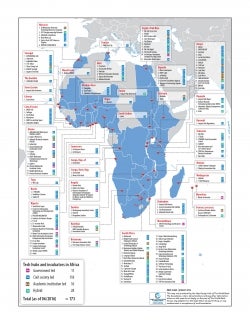Also available in:
Español

As the World Bank’s ongoing mapping of Tech Hubs in Africa comes out with its newest edition, we wanted to share the rationale behind this exercise and highlight its links to other efforts in this innovative space.
Our mapping activities began tracking tech hub and incubators in the African context since 2014 with periodic updates, focusing specifically on those who support digital entrepreneurship.
Complementing other World Bank work in this realm, such as research on mLabs and mHubs, contributions to the Makers’ movement, support to mobile app competitions, bootcamps and hackathons, and an upcoming Pan-African Acceleration program, the Tech Hubs in Africa map highlights the presence and potential interaction between digital entrepreneurs, while furthering the World Bank’s twin goals of ending poverty and increasing shared prosperity. The exercise also provides data points for ongoing inquiry into the relationship between innovation, entrepreneurship, job creation, and sustainable livelihoods.
Digital Entrepreneurs
To this end, we track tech hubs, which we define as spaces mainly focused on developing a digital entrepreneurship ecosystem, or a network of engagement between digital entrepreneurs, designers and potential investors. Tech hubs’ ecosystem build-out also includes linking established digital/mobile businesses offering services or mentorship to new entrepreneurs and consumers (rural or urban depending on the context). In addition, Tech hub activities facilitate idea generation programming such as brainstorming sessions that engage consumer groups with developers, “intro-to-coding” workshops, hackathons and Start-Up Weekends, while offering a shared-working space, business skills, lectures or technology-related training opportunities.
We also track tech incubators, which we define as organizations that predominantly offer targeted, time-bound activities and resources through application-based “go-to-market” programs for early stage digital and tech entrepreneurs. Entry categories and descriptions aim to highlight where government, academic institutions, private firms, and civil society groups are supporting innovation through funding and other resources, and to what degree of success.
The numbers of innovation actors in African countries span beyond the material logged in this mapping, as recent research from the GSMA Ecosystem Accelerator and a March 2016 Disrupt Africa article support. Many organizations also wear multiple and overlapping hats, our definitions do not mean to stifle or silo their activities. As comments on our map highlight, the terms incubator and accelerator are often used interchangeably, and are at times differentiated by variations in program timeline, skill development, selection process, or access to seed funding. We also include spaces, such as many of the Fab Labs, who offer the digital entrepreneurship support this project aims to study, but who might also be identified as makerspaces, hackerspaces, or fabrication studios. Similarly, other entrepreneurship stimulators might include some activities falling within a tech hub, incubator, or accelerator repertoire, but are not logged in this exercise depending on their overall focus area or governance model.

Mapping the larger space
Yet the innovation space grows week by week, and with it, the diversity of actors grows as well, whether they be pitching products to consumers or catering to digital entrepreneurs, designers, hackers, and developers—all significant market segments in their own right. As Rob Baker, formerly of the World Bank and now with USAID’s Global Development Lab, recently blogged in reference to the global Makers movement, we too must ask, “Where is the one great list?”
What opportunities, services, and programs do different organizations offer, where are they, and to whom do they peddle their wares? The answer is a longer one, which goes beyond our current mapping exercise, and which requires much collaboration in its own right.
Like the World Bank’s mapping, other projects have also looked into particular aspects of global innovation. Open.co’s online database looks into hub organizational dynamics on various themes, including peace and reconciliation, coaching and co-working spaces for civil society groups, and non-tech start-up support. Fab Foundation’s Fab.io map and underlying API for Fab Labs, the Impact Hub and Jokkolabs lists of consortium members, the Hackerspaces wiki, and makers.json, an API for Makerspaces, are other contributors to the space. With funding from GIZ and others, the Ananse Group is now aggregating existing global innovation datasets in an ongoing project to amass data on a much larger scale and create an open space for innovation actors and observers to dialogue and learn from one another.
In addition to World Bank fixed and interactive maps (forthcoming, and complete with accessible data sets), our data contributes to the Ananse Group’s Atlas of Innovation Spaces database, and we look forward to ongoing learning and information sharing. This work is ongoing, so stay tuned for more developments, both based on our lists and those of our various collaborators and partners. And, as always, we welcome feedback and notifications on any changes to the innovation space!



Join the Conversation